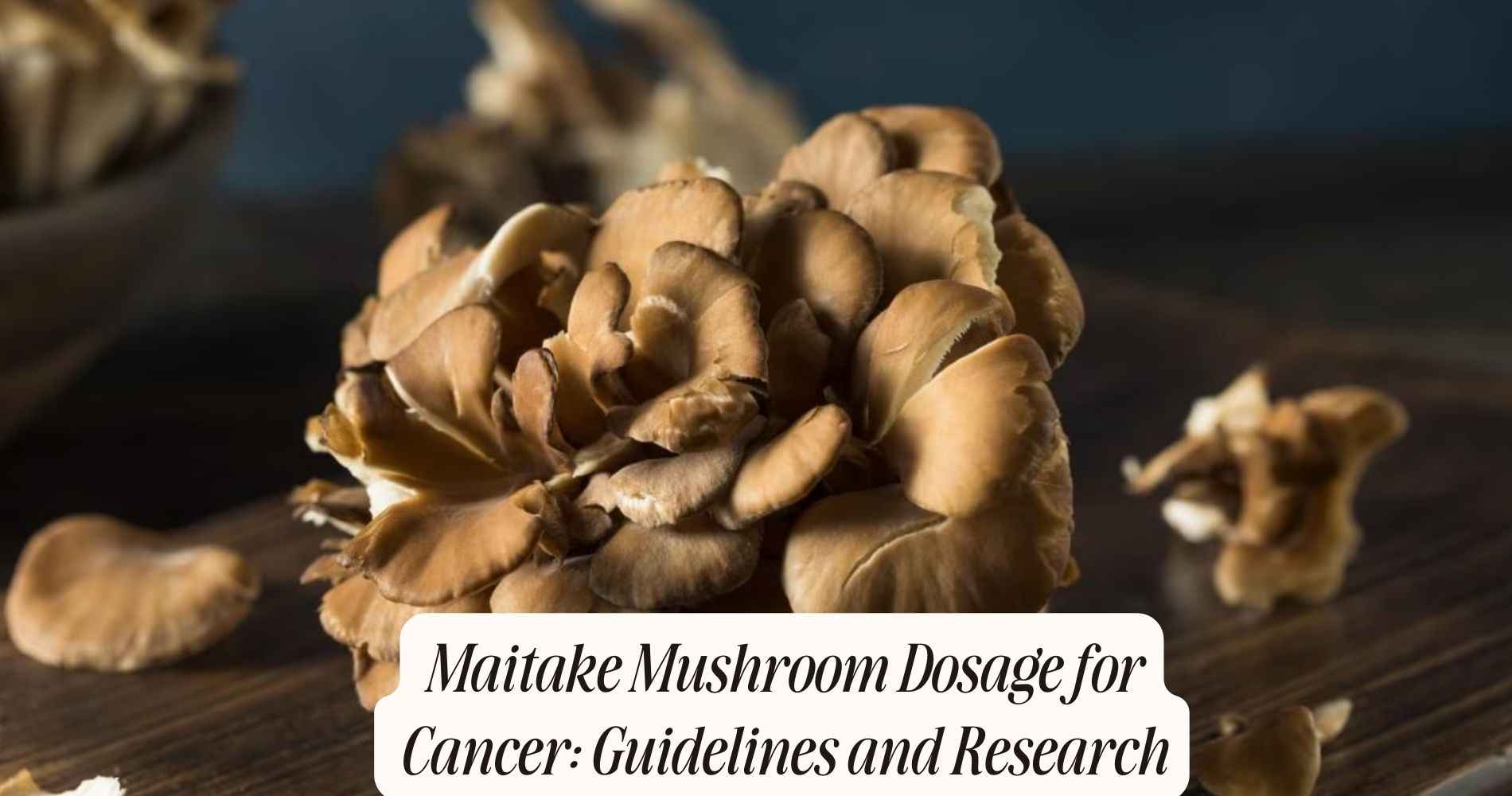
Can Teens Take Lions Mane? Safety and Benefits Explained
Can teens take lions mane? Teens can take Lion's Mane, but with caution and advice from healthcare providers. Lion's Mane mushrooms are known to potentially enhance cognitive function, memory, and stress management due to their stimulation of nerve growth factor (NGF). While there's limited research specifically on adolescents, starting with a lower dose (250-500 mg per day) might minimize risks. Be mindful of possible side effects like allergic reactions and gastrointestinal discomfort. Always guarantee the product comes from a reputable brand and seek medical advice to tailor the dosage appropriately. More details can provide deeper insights into its impact and safe usage.
What Is Lion's Mane?
Lion's Mane is a type of medicinal mushroom known for its potential cognitive and neurological benefits. Historically, it has been used in traditional Chinese medicine for centuries. Ancient practitioners believed it could enhance memory and overall brain function. This historical usage provides a foundation for modern scientific interest in its potential health benefits.
In addition to its medicinal properties, Lion's Mane has also found a place in the culinary world. Chefs appreciate its unique texture and flavor, often likened to seafood, particularly crab or lobster. Its versatility allows it to be used in various dishes, from soups to stir-fries, making it a popular ingredient in both Asian and Western cuisines. The mushroom's ability to absorb flavors and provide a satisfying, meaty texture makes it a favorite among vegetarians and vegans.

Understanding Lion's Mane's dual role in history and cuisine can help you appreciate its potential benefits more thoroughly.
Whether you're exploring its historical roots or culinary applications, it's clear that Lion's Mane offers more than just a boost to your cognitive health. Its rich history and delicious versatility make it a fascinating subject for further exploration.
How Lion's Mane Works
The active compounds in Lion's Mane, known as hericenones and erinacines, are believed to stimulate the production of nerve growth factor (NGF) in the brain. NGF is vital for the maintenance, growth, and survival of neurons, which are the building blocks of your nervous system. By boosting NGF levels, Lion's Mane may promote neural growth, aiding in the repair and regeneration of nerve cells. This process is essential for maintaining cognitive functions and overall brain health.
Research has shown that enhanced neural growth can lead to better memory improvement. In animal studies, Lion's Mane has demonstrated potential in reversing memory deficits. While these findings are promising, it's worth mentioning that human studies are still limited. However, preliminary research suggests that Lion's Mane could enhance cognitive functions in adults, which may extend to teens as well.
It's crucial to understand that while the potential benefits are intriguing, more rigorous clinical trials are needed to confirm these effects in adolescents specifically.
Always consult a healthcare professional before introducing any new supplement, especially for teens, to make sure it's suitable for their unique needs and developmental stage.

Teen Brain Development
During adolescence, the brain undergoes significant development and reorganization, which can impact cognitive functions and emotional regulation. This period is marked by the maturation of the prefrontal cortex, the area responsible for decision-making, impulse control, and social behavior.
You should understand that both genetic factors and the social environment play vital roles in shaping the teen brain.
Genetic factors influence the rate and pattern of brain development. Some adolescents might experience these changes more rapidly or differently due to their unique genetic makeup. This can affect not only their cognitive abilities but also their emotional resilience and susceptibility to mental health issues.
On the other hand, the social environment also holds considerable influence. Positive interactions with family, peers, and mentors can promote healthy brain development and emotional well-being. Conversely, exposure to stress, trauma, or negative social settings can hinder cognitive and emotional growth.
Given these dynamics, it's important to explore how any supplement, including Lion's Mane, could impact the developing brain.
Understanding these factors provides a thorough view of the teen brain, setting the stage for discussing how supplements might influence this critical period of development.
Potential Benefits for Teens
You might be interested to know that Lion's Mane has shown potential benefits for teens, including cognitive function enhancement, mood and anxiety support, and an immune system boost.
Research indicates that its compounds may help improve memory and focus, which is vital during the demanding teen years.
Additionally, studies suggest it could help manage stress and bolster immune health, contributing to overall well-being.
Cognitive Function Enhancement
Emerging research suggests that Lion's Mane mushrooms may enhance cognitive function in teens by supporting neurogenesis and improving memory retention. These mushrooms contain bioactive compounds like hericenones and erinacines, which are believed to stimulate the production of nerve growth factor (NGF), essential for brain health. NGF plays a vital role in maintaining and regenerating neurons, which can directly impact memory retention and focus improvement.
Studies have shown that Lion's Mane may help improve cognitive function in both animals and humans. For example, a 2009 study found that older adults who consumed Lion's Mane for 16 weeks showed significant improvements in cognitive function compared to those who took a placebo. While research specifically on teens is limited, these results are promising and suggest potential benefits for younger individuals as well.
However, it's important to bear in mind that the current evidence is still emerging, and more research is needed to fully understand the long-term effects and best dosages for teens. Consulting with a healthcare provider before introducing any new supplement is always a prudent approach to ensure safety and efficacy. By doing so, you can make an informed decision about incorporating Lion's Mane into your teen's routine for cognitive enhancement.

Mood and Anxiety Support
Many studies suggest that Lion's Mane mushrooms may alleviate mood disorders and anxiety in teens by modulating neurotransmitter levels and reducing inflammation. Research indicates that this mushroom can boost the production of nerve growth factor (NGF), which is vital for maintaining healthy brain cells. By supporting NGF production, Lion's Mane may enhance mental clarity and contribute to better emotional regulation.
Additionally, the anti-inflammatory properties of Lion's Mane can play a significant role in stress reduction. Chronic inflammation is often linked to mood disorders and anxiety, so reducing inflammation may help mitigate these issues. For teens, who are frequently under academic and social pressures, the potential for stress reduction is particularly advantageous.
However, while preliminary findings are promising, it's important to approach these benefits with cautious optimism. The existing studies are primarily conducted on animals or small human samples, and more extensive research is needed to confirm these effects in teens specifically. Before incorporating Lion's Mane into a teen's regimen, it's advisable to consult a healthcare provider to make sure it's suitable for their individual needs.
Immune System Boost
In addition to its potential benefits for mood and anxiety, Lion's Mane may also support the immune system in teens by enhancing the body's natural defense mechanisms. Research suggests that Lion's Mane contains bioactive compounds that could act as immune boosters, helping to fortify the body's immune response. For teens, whose immune systems are still maturing, this can be particularly advantageous.
Studies indicate that Lion's Mane may stimulate the production of beneficial proteins and cells, such as cytokines and macrophages, which play critical roles in the immune response. By promoting the activity of these immune cells, Lion's Mane might help teens fend off common infections and illnesses more effectively. Additionally, its antioxidant properties can protect immune cells from oxidative stress, further supporting overall immune health.
However, while the potential immune-boosting effects of Lion's Mane are promising, it's important to approach supplementation with caution. Existing research, though encouraging, is still limited, and most studies have been conducted on animals or in vitro.
As such, consulting a healthcare provider before introducing Lion's Mane into a teen's regimen is crucial. This balanced approach ensures that any potential benefits are weighed against possible risks, providing the best outcome for your teen's health.
Safety Concerns
When contemplating the safety of Lion's Mane for teens, it's crucial to assess both scientific studies and anecdotal evidence. One concern is the potential for allergic reactions. Some individuals might experience skin rashes, difficulty breathing, or gastrointestinal discomfort after consuming Lion's Mane. While these reactions are relatively rare, they underscore the importance of caution, especially if your teen has a history of allergies.
Another critical aspect to take into account is contamination risks. Like all supplements, Lion's Mane products can vary in quality. Poor manufacturing practices might lead to contamination with harmful substances such as heavy metals, pesticides, or harmful bacteria. Always choose products from reputable brands that use third-party testing to guarantee purity and safety.

Additionally, it's crucial to monitor any new dietary supplement's impact on your teen's health. Start with a lower dose to observe any adverse effects. Encourage open communication so your teen feels comfortable reporting any unusual symptoms. While Lion's Mane has been generally well-tolerated in many, individual reactions can vary.
Prioritizing safety and quality can help mitigate these risks and make the potential benefits more accessible for your teen.
Possible Side Effects
While Lion's Mane supplements are generally considered safe, you should be aware of possible side effects that may occur, especially in teens. One of the primary concerns is the risk of allergic reactions. Although rare, some individuals might experience symptoms such as skin rashes, itching, or difficulty breathing after consuming Lion's Mane. If your teen has known allergies to mushrooms, it's important to proceed with caution and consult a healthcare professional beforehand.
Another potential side effect is gastrointestinal discomfort. Some teens may experience stomach upset, nausea, or diarrhea when taking Lion's Mane supplements. These symptoms are typically mild and often resolve on their own, but they can be uncomfortable and disruptive. To minimize these risks, start with a low dosage and gradually increase it while monitoring for any adverse reactions.
It's also worth noting that there's limited research on the long-term effects of Lion's Mane in younger populations. While many studies highlight its cognitive and neurological benefits, definitive conclusions about its safety profile in teens are still lacking. Therefore, maintaining open communication with your healthcare provider can help ensure that Lion's Mane is a safe and effective option for your teen.
Practical Tips for Use
When considering Lion's Mane for teens, it's essential to follow recommended dosage guidelines to ensure safety and effectiveness.
You should also explore the best consumption methods, such as capsules, powders, or teas, to find what works best for your teen.
Consulting with a healthcare professional can provide personalized advice tailored to individual needs.
Optimal Dosage Guidelines
Determining the best dosage of Lion's Mane for teens requires careful consideration of existing research, individual health conditions, and consultation with a healthcare professional. While specific studies on teens are limited, existing evidence suggests that a conservative approach is prudent. For teens, a common starting point is around 500 mg per day, gradually increasing to a maximum of 1000 mg, depending on individual response and healthcare advice.
Best Consumption Methods
For maximizing the benefits of Lion's Mane, consider integrating it into your teen's daily routine through various practical consumption methods. Lion's Mane comes in several supplement forms, such as capsules, powders, and tinctures. Capsules are convenient and offer precise dosages, making them ideal for busy teens.
Powders can be easily added to smoothies, yogurt, or even baked goods, offering flexibility in preparation techniques while ensuring the mushroom's benefits are retained.
Tinctures provide another versatile option, allowing for easy incorporation into drinks like tea or juice. They're absorbed quickly, which can be beneficial for those needing faster effects. When choosing a supplement form, prioritize products that are third-party tested to guarantee purity and potency.
It's also essential to educate your teen on the importance of consistency. Regular intake, rather than sporadic use, is key to experiencing the cognitive and health benefits associated with Lion's Mane. Combining it with a balanced diet and healthy lifestyle will amplify its effects.
While the mushroom can be taken at any time, some suggest morning consumption to align with the body's natural rhythms, potentially enhancing alertness and focus throughout the day.
Enhance Your Wellness Journey with SUPER MUSHROOM GUMMIES
While exploring whether teens can safely take Lion's Mane, it's also worth considering other natural supplements that are designed for safety and efficacy. Well Gummies' SUPER MUSHROOM GUMMIES are an excellent addition to any wellness routine. These easy-to-consume gum chews are packed with 10 types of functional mushrooms, offering a convenient way to fuel the brain and energize the body. Suitable for teens and adults alike, our vegan gummies provide calmer energy, sharper focus, and robust immune support—all crucial for a balanced body and clear mind. Plus, they taste like fresh wild berries, making them as enjoyable as your favorite candy, but without any jitters or crashes. Introduce SUPER MUSHROOM GUMMIES to your family's daily regimen for a healthier, more vibrant lifestyle.
Frequently Asked Questions
Can Lion's Mane Interact With Other Supplements or Medications Teens Might Be Taking?
You should be cautious about potential interactions between lion's mane and other supplements or medications teens might be taking. Always consult a healthcare professional to guarantee supplement safety and avoid adverse effects.
Is Lion's Mane Suitable for Teens With Specific Health Conditions or Allergies?
You should consult a healthcare provider before giving lion's mane to teens with health conditions or allergies. It could cause allergic reactions or interact negatively with their specific health issues, making professional guidance essential.
Are There Any Specific Brands of Lion's Mane Recommended for Teens?
When considering specific brands of lion's mane for teens, you should look at brand reviews and choose reliable manufacturers. Some well-reviewed brands include Host Defense and Real Mushrooms, known for their quality and safety standards.
How Long Does It Take to See Noticeable Effects From Lion's Mane in Teens?
You'll typically see noticeable effects from lion's mane in teens within a few weeks, but it depends on individual responses. Following dosage guidelines closely can help guarantee the best outcomes for cognitive and overall health benefits.
Can Teens Consume Lion's Mane Through Diet Instead of Supplements?
Yes, teens can consume lion's mane through dietary sources like fresh mushrooms. This method could enhance nutrient absorption compared to supplements. However, make sure they're properly cooked to avoid potential allergens and maximize their health benefits.
Conclusion
To sum up, incorporating Lion's Mane into a teen's routine could offer cognitive benefits and support brain development, but it's important to proceed with caution. While some studies suggest potential advantages, the evidence remains limited.
Always consult healthcare professionals before starting any supplement. By staying informed and cautious, you can make the best decision for your teen's health and well-being. Prioritize their safety and consider all factors to guarantee a balanced approach to supplementation.




